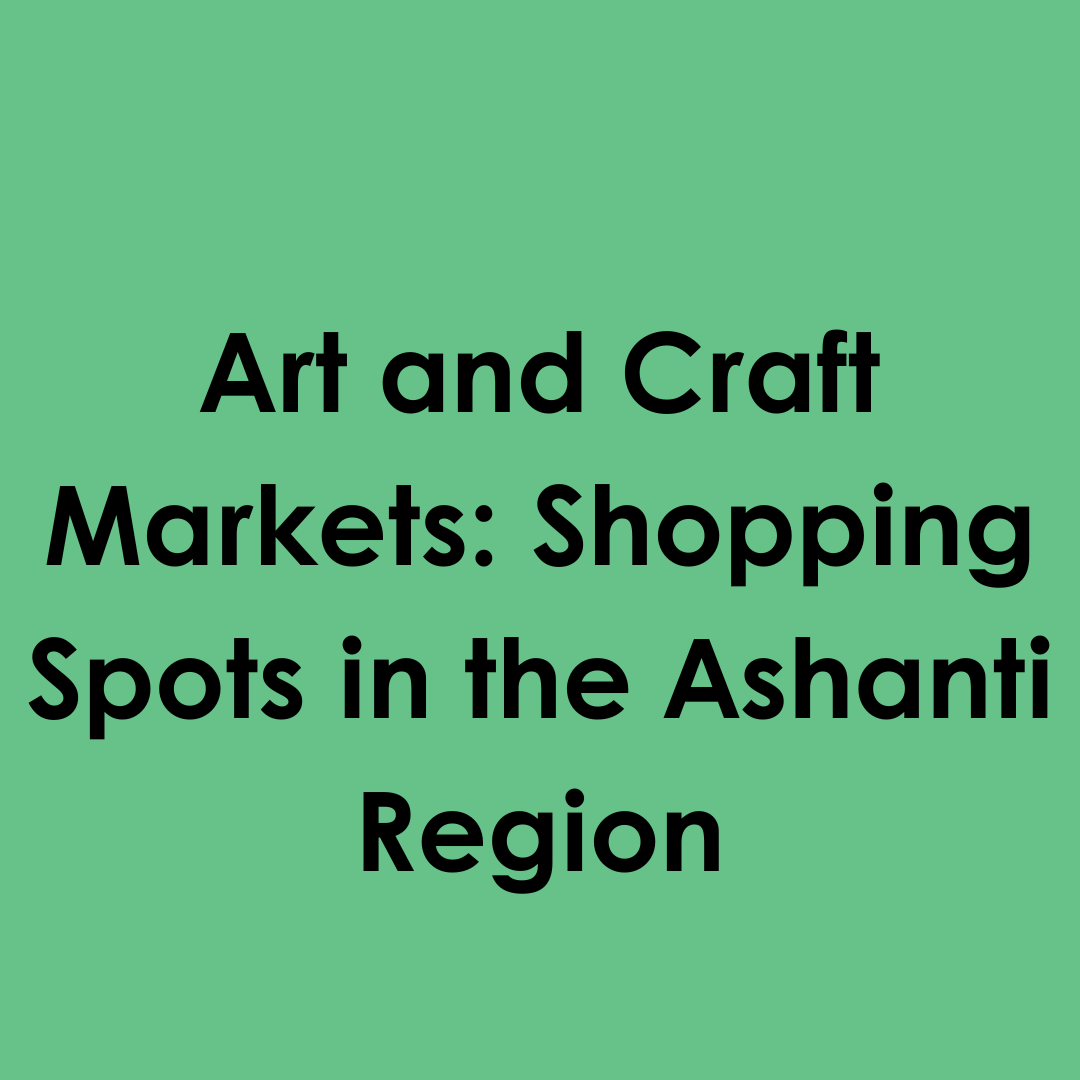The Ashanti Region of Ghana is renowned not only for its rich history and vibrant culture but also for its unique art and craft markets. These markets are treasure troves of traditional and contemporary art, offering an array of items from intricate textiles to beautifully crafted pottery. For anyone visiting the region or locals looking to explore the artistic wealth of their homeland, these markets provide a perfect destination. Here are some of the best spots to immerse yourself in the local craftsmanship and perhaps find that perfect piece to take home.
1. Kumasi Central Market (Kejetia Market)
As one of the largest markets in West Africa, Kumasi Central Market, often referred to as Kejetia Market, is a bustling hub of activity. The market recently underwent a major renovation, transforming it into a more organized and navigable space. Here, artisans from across the region sell a wide variety of goods, including traditional Kente cloth, carved stools, and handwoven baskets. It’s a vibrant place where bargaining is part of the experience, and the colorful displays of fabrics and crafts make it a visual feast.
2. Ahwiaa Craft Village
Located just a few kilometers from Kumasi, Ahwiaa is famed for its skilled woodcarvers. The village is particularly noted for the craftsmanship of stools, fertility dolls, and masks. These items are not only significant in the local culture but are also admired worldwide for their aesthetic and symbolic values. Visitors to Ahwiaa Craft Village can watch artisans at work, learn about the techniques and stories behind their crafts, and purchase directly from the creators.
3. Ntonso Adinkra Craft Village
Ntonso is the heartland of Adinkra cloth production, a type of fabric that is stamped with traditional Ashanti symbols, each bearing its own meaning. This village offers a unique experience where you can see the entire process of Adinkra making—from the carving of the stamps to the preparation of natural dyes and the final stamping on the cloth. For a truly immersive experience, visitors can even participate in workshops to create their own Adinkra cloth.
4. Bonwire Kente Village
Bonwire is synonymous with Kente cloth, a prestigious and colorful fabric that is often seen at Ghanaian traditional events. The weavers in Bonwire use time-honored techniques to create both traditional and contemporary Kente designs. The village itself offers a picturesque backdrop to the rows of looms and the rhythmic sounds of weaving. Kente from Bonwire makes a special souvenir or gift, embodying the spirit and history of the Ashanti people.
5. Pankrono Pottery Village
Pankrono is well-known for its pottery, crafted using local clays and traditional methods that have been passed down through generations. The pottery range includes functional items such as pots and bowls as well as decorative pieces. Touring the Pankrono Pottery Village provides insight into the skilled labor involved in pottery making and offers the chance to support local artisans directly by purchasing their goods.
6. Adanwomase Kente and Silk Village
Adanwomase, another village dedicated to the art of Kente, also specializes in silk weaving. The village is unique in its offering of a tour that showcases the entire process of silk Kente weaving, from the rearing of silkworms to the spinning and dyeing of the silk. Visitors to Adanwomase are greeted with a warm welcome and are often invited to try their hand at weaving, making it a participatory and memorable experience.
7. Asawase Market
For those interested in a more urban craft experience, Asawase Market in Kumasi offers a different vibe. This market is known for its leatherwork, with numerous stalls selling handcrafted sandals, belts, and bags. The artisans here are skilled in both traditional techniques and modern designs, making it a great place to find unique leather goods.
Visiting Tips
When visiting these markets and craft villages, it’s important to remember a few key tips:
-
Bargaining is customary, so don’t hesitate to negotiate prices.
-
Be respectful of the artisans and their work. Asking permission before taking photographs is always appreciated.
-
Consider the timing of your visit; mornings are usually less crowded.
-
Carry cash, as many vendors do not accept credit cards.
Exploring the art and craft markets in the Ashanti Region not only supports the local economy but also provides a deep insight into the cultural fabric of Ghana. Each item has a story, and every purchase contributes to preserving the artisanal heritage of the Ashanti people. Whether you’re an art collector, a culture enthusiast, or simply looking for a meaningful souvenir, these markets promise a rewarding and enriching experience.
Explore Ashanti with Grassroot Tours
Grassroot Tours offers an enriching and authentic way to experience the vibrant culture and artisanal heritage of the Ashanti Region. Specializing in immersive tours, they provide visitors with an unparalleled opportunity to delve into the heart of Ghana’s artistic communities. With Grassroot Tours, you’ll explore renowned craft villages and bustling local markets under the guidance of knowledgeable local guides.
The tours are thoughtfully designed to connect you with the history and traditions of the Ashanti people. Whether you’re marveling at the intricate designs of Kente weavers in Bonwire, observing the skilled woodcarvers in Ahwiaa, or participating in an Adinkra cloth-making workshop in Ntonso, Grassroot Tours ensures a hands-on and insightful experience. They take care of all logistical aspects, from transport to entry fees, ensuring a hassle-free and enlightening visit.
Moreover, Grassroot Tours is committed to sustainable tourism practices that respect the local culture and support the artisans directly. By choosing Grassroot Tours, you’re not only gaining insight into the rich cultural tapestry of Ghana but also contributing to the livelihood of the local communities. Their tours are ideal for culture enthusiasts, art collectors, and anyone looking to experience the genuine spirit of the Ashanti Region.


